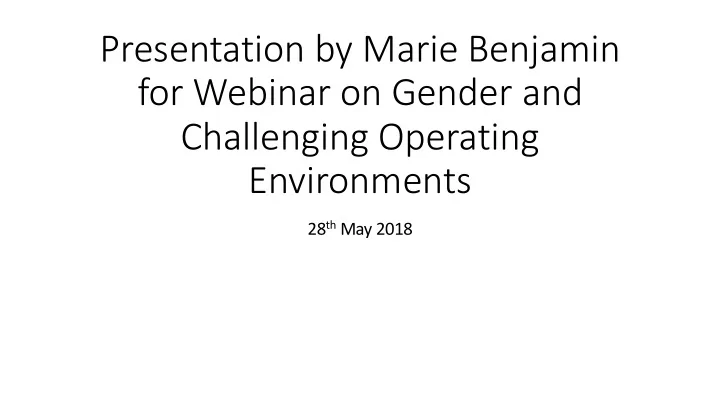

Presentation by Marie Benjamin for Webinar on Gender and Challenging Operating Environments 28 th May 2018
INTRODUCTION • I am Marie Benjamin, Programme Coordinator of SWAA(Society for Women and AIDS in Africa) Sierra Leone Chapter • Vision – Reducing the impact of HIV on Women and Girls and their families • With the Global Fund – SWAA addresses HIV prevention for FSWs as a key population • Chair of CARKAP – Advocating for the Right of Key affected populations as one of few women • Representing KP interest on the CCM
• Based on EANNASO’S abridged version of the COES I am going to take the approach of basing my presentation on the 3 key areas: • Flexibility • Partnership • Innovation
FLEXIBILITY • As implementing partner now part of the Global Fund Process from concept note to budget development • Support of Global Fund for Consortium of Civil society organisations for advocacy and watchdog role • Room for reprogramming activities to achieve the greatest impact, Catch –up plan
PARTNERSHIP • Working with other organisations like UNAIDs, Legal Aid Board, health service providers • Bringing in Private Sector a challenge for now despite work place policy in place • Accessing technical assistance – not aware of availability of TAs and knowing needing the capacity (omen’s groups especially) to access them
Innovation • The capacity on the how of ‘innovative thinking’ with the problems to handle in the already challenging operative environment • Learning from the different ways other countries have similar overcome challenging situations • For Sierra Leone innovation has been: • Establishing the Consortium of CSOs for advocacy and watchdog role • Strengthening of community engagement to increase a cces to services and reach more women and adolescentd
Challenges • Working in Sierra Leone with the recent history of Ebola and flood/mudslide • Most women vulnerable due to factors from the war, ebola , mudslide in terms of how it has impacted women – more women and girl headed households, low level of education, access to health services • Weak programs targeting women and adolescents
Recommendations /Conclusion • Opportunities for experience sharing to integrate best practices observed into our programs • Need for more robust advocacy for policies that support women in the context of accessing health services • Dissemination of information on the Gf COE policy
Recommend
More recommend